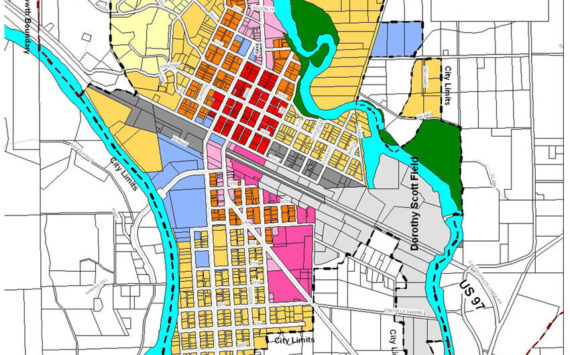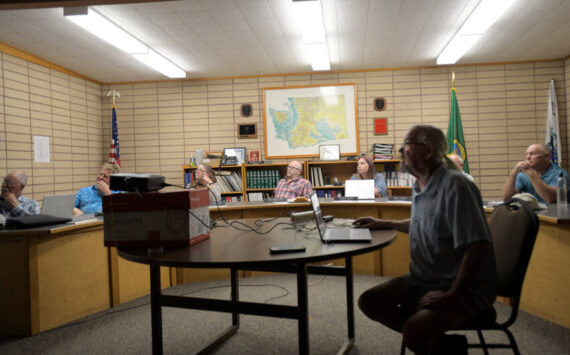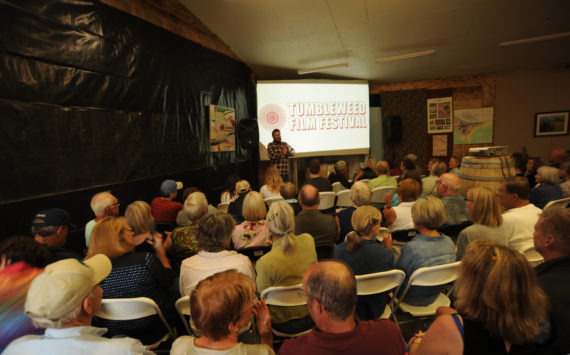 Republic and Oroville will feel the effect of mine shut down differently. The ‘boom and bust’ cycle mining can bring to an area has been readily apparent in Republic for years – one could tell just by looking at the number of full or empty businesses on Main Street. That cycle has been a missing component in Oroville’s history at least since the time when gold was first discovered in Washington State – the 1859 gold find near Shanker’s Bend by U.S. Army soldiers doing a boundary survey. It was around that time the town got the dubious monicker of “Rag Town” due to all the tents that served as businesses and homes. That boom lasted until the next big discovery tempted prospectors and they all lit out for richer territory.
Republic and Oroville will feel the effect of mine shut down differently. The ‘boom and bust’ cycle mining can bring to an area has been readily apparent in Republic for years – one could tell just by looking at the number of full or empty businesses on Main Street. That cycle has been a missing component in Oroville’s history at least since the time when gold was first discovered in Washington State – the 1859 gold find near Shanker’s Bend by U.S. Army soldiers doing a boundary survey. It was around that time the town got the dubious monicker of “Rag Town” due to all the tents that served as businesses and homes. That boom lasted until the next big discovery tempted prospectors and they all lit out for richer territory.
Last week there was a meeting in Republic about what will happen now that the Buckhorn Gold Mine is closing in 2015 and gold exploration permits in the area have been delayed so much by the U.S. Forest Service that Kinross has all but given up on expanding in the area.
While Republic and Ferry County have relied on gold as a big component of the local economy, Oroville, and Okanogan County have relied on fruit production, timber and cattle as the legs of their three-legged stool. Those at the meeting in Republic informed Lt. Governor Brad Owen, state legislators and agency representatives that not only has the federal government made it hard to explore and continue the life of the mine, their agencies have also thrown up roadblocks to the more traditional industries in both counties. When Owen was a state legislator, he and some of his fellow legislators representing rural counties on the west side shared their stories of the rush to enact legislation to help struggling timber communities being regulated out of business in the 1980s and 90s. They said a similar program needed to be done here.
Before the mine, there was talk of boom and bust by opponents and proponents during the 20 some odd years that it took to get the Buckhorn going. Of course like the old saying “it is better to have loved and lost than never to have loved at all,” it’s also better to enjoy the fruits of temporarily good economic times than to flounder endlessly in economic hard times. But, unlike love, with mining, or any resource-based industry – you should always be looking ahead to when or if the good times play out. Make hay while the sun shines, so to speak.
While Oroville and Okanogan County, particularly the school district, benefited most from the property taxes generated by the mine, Ferry County benefited mostly by the jobs the mine and ore mill created – both directly through employment at the mine and mill and through those who contracted with the company. The meeting had more to do with what the Republic area will do now that the mine is closing and not so much what the Oroville area will do. Yes, job and assistance programs through state agencies can benefit the Oroville and the Republic areas alike. Questions about what happens when Kinross isn’t paying as much in property taxes went unasked. Local taxing districts all benefited from the mine with voters more willing to pass double-sized school levies when they knew a rich mining company was going to have to shoulder most of the increase. What happens when that goes away? We still need to collect the same total amount, but the burden will be loaded on to the backs of the remaining property owners. Why did the school district ask for twice as much money? It wasn’t just because it was known the mine would be paying a big share of the increase, it was because the property value went up so much in the district, the schools lost their Levy Equalization money. We were now too well off to need the help. The big question is will we once again be eligible for LE monies again and what hoops the state will make us jump through to get them.
It would be a good thing if we could get the same group to come to a similar meeting in Oroville. This would give Oroville city and school representatives, county commissioners and others who benefited from the boom the mine generated a chance to ask: What’s next?







